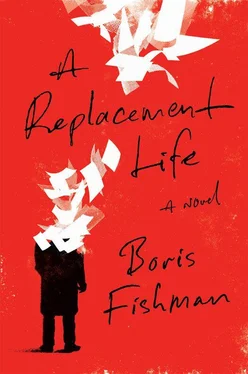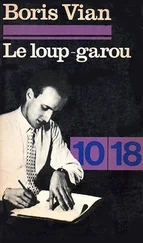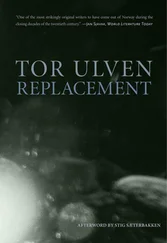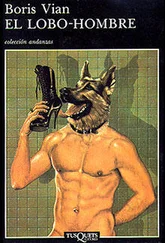“Slava, how evorytyng?” Rich said now from the depths of the closet. He had buffed the foyer, and Slava, a dozen feet from the door, squeaked with every step. With a dancer’s precision, the cumbersome Pole emerged from the thicket of dry cleaning and delivery boxes and slid his hand into the door handle. “Have nice day, pliz, okay?” he said with touching disdain.
Our first American death. Have nice day, pliz. As Slava strode out of the building, the day’s what-ifs again presented their tempting alternatives. Rich still got the door first, the 6 train was still inept for the crush of the Upper East Side, and Grandmother was still alive, scratching weakly at her lesions in a bathrobe in Midwood. Sure, her bile ducts were blocked, her bilirubin was high — Billy Rubin, he was a half-Jewish boy, he wouldn’t hurt her! — but she was still there, chomping her lips and glowering at Grandfather.
Since the last time Slava had come to South Brooklyn — almost a year prior; his mother could count without pity — a new residential tower had started to grow around the corner from his apartment building, two restaurants on his block had shuttered and reopened as others, and the local councilman had been forced out in a sex scandal. As the train surged above-ground at Ditmas, Slava rode past the same repair shops and convenience stores, the same music bouncing from the tinted windows of spoilered Camaros, the same corrupt councilman on the billboards (only his vice was kickbacks). These people had come to America to be left alone.
Here was a foreign city, if you were coming from Manhattan. The buildings were smaller and the people larger. They drove cars, and for most, Manhattan was a glimmering headache. As the train neared Midwood, the produce improved and the prices shook loose. Here, a date tasted like chocolate, and it was a virtue to persuade the grocer — Chinese not Korean, Mexican not Arab — to have it for less than the cardboard placards wedged into the merchandise said. This was still a world in the making. In some of its neighborhoods, the average time since arrival was under twelve months. These American toddlers were only beginning to crawl. Some, however, had already found the big thumb of American largesse.
Grandfather lived on the first floor of a tawny-bricked building tenanted by old Soviets and the Mexicans who wouldn’t let them sleep. His senior-citizen benefits didn’t permit him to make an appearance on official payrolls. To the Kegelbaums in 3D, he sold salmon picked off the wholesalers for whose deliveries he waited in front of Russian food stores. Why pay $4.99/lb inside when he could pay $3 on the sidewalk? The boys in the wholesale truck laughed and threw him free flounder and cod.
Next door to the Kegelbaums were the Rakoffs, American Jews. These were aghast by the seafood emerging from the mesh grocery bag in Grandfather’s hands. The Aronsons (Soviet, 4A) paid for the nitroglycerine that Grandfather’s doctor overprescribed in exchange for a monthly bottle of Courvoisier cognac. To the Mexicans (2A, 2B, illegal basement apartment) Grandfather gave haircuts, because they partook of neither salmon nor nitroglycerine. The churn in which these new arrivals gained body barely had time to spit out cream before it was refilled. Naturally, each batch was thinner than the one that preceded it.
Slava scaled the stairs to the first floor and stood before Grandfather’s door. On an ordinary day, you could hear his television from the ground-floor mailboxes — revenge on the basement Mexicans, who smashed tallboy Budweisers into smithereens until dawn on the weekends. Now it was soundless, on this side of the door the glory of a day just like any other.
It gave without knocking. Usually, Grandfather bolted all three locks — in this part of Brooklyn, eyes still roamed with Soviet heights of desire. But it was a day of mourning. Like Tolstoy’s villagers putting on the lights outside after dinner, he was asking for company.
Inside, a sweet glaze hung in the air, dishes clattering in the kitchen. Slava slipped off his shoes and tiptoed the length of the hallway until he could see into the living room. Grandfather was on the beige sofa, the ash-colored down of his hair in his hands. On the street, women noticed Grandfather — Italian cashmere, his hands and forearms needled with sea-colored tattoos — before they noticed the grandson holding his arm. Now the old man was in gym trousers and undershirt, looking like an old man. His toenails were testing the air, as if to make sure the world was still there.
The sofa hissed as Slava lowered himself next to Grandfather. Yevgeny Gelman removed his hands from his face and stared at his grandson as if he were unknown and it was an affront to encounter another person without the woman alongside whom he had spent half a century. Slava was the notice that a million diabolical dislocations awaited.
“Gone, your grandmother,” Grandfather whimpered, and rolled his head into the starch of Slava’s shirt. He honked out a sob, then sprang back. “It’s a nice suit,” he said.
“Mom call?” Slava said. The Russian words sounded as if said by another: nasal, arch, ungrammatical. He had spoken Russian last when he had spoken last to his mother, a month before, though he continued to swear in Russian and he continued to marvel in Russian. Ukh ty. Suka. Booltykh . These had no improvement in English.
Grandfather searched Slava’s face for adequate grasp of his heartache. “Mama’s at Grusheff’s,” he said. “She said to call people and tell them. The Schneyersons are coming. Benya Zeltzer said he’ll try to get free. He owns three food stores.”
“Is anyone helping her?” Slava said.
“I don’t know. That rabbi, Zilberman?”
“You know Zilberman isn’t a rabbi,” Slava said.
Grandfather shrugged. Certain questions he did not ask.
Zilberman wasn’t a rabbi. As Kuvshitz wasn’t a rabbi, nor Gryanik. They loitered in the hospital waiting rooms, Soviet immigrants who had learned a little Hebrew and were conveniently present to ennoble a passing like Grandmother’s with Torah-compliant burial guidance for a small fee. And why not? Their brothers and cousins hauled furniture, drove ambulettes starting at sunrise, skim-coated walls until their fingers shredded and bled — so who was smart.
And were these men not delivering exactly what their customers wanted? Were they not, simply, in the American way, addressing a demand of the market? Their compatriots had spent too many years under Soviet atheism to observe Jewish ritual now that they were free to do so, but they wanted a taste, a holy sprinkling, a forshpeis . Enter Zilberman et al., temporarily transformed into Moshe, Chaim, Mordechai. These artists of gray zones picked from the religious guidance on Jewish burials selectively. Immediate burial, as per Jewish law — certainly. As for a plain pine coffin, rimmed by no flowers — was that really right? The deceased may not have been a millionaire or an international personage, but he or she had been an anchor of families, a sufferer of world wars, a bearer of plain wisdom. This person deserved greater than #2 pine. Grusheff Funeral Home — Valery Grushev thought the two f’s made his name sound as if his ancestors had come with the aristocracy that had fled the Bolsheviks via France in 1917—had coffins from Belarusian birch, California redwood, even Lebanese cedar. Didn’t those who’d known the deceased deserve an opportunity to say goodbye one last time at a service? From each milestone of grief, Moshe and Chaim collected percentages.
“I’ll help call if you’d like,” Slava said to Grandfather.
“I’m almost finished,” Grandfather said. “Not that many people to call, Slava.”
In the kitchen, a pot crashed into another, interrupting the rush of the sink water. A woman cursed herself for clumsiness. Grandfather lifted his head, his eyes alert once again. “Come,” he said, his hand on Slava’s forearm. “Things change, you don’t come for so long.” Rising, he leaned on Slava’s arm with more weight than he needed.
Читать дальше











